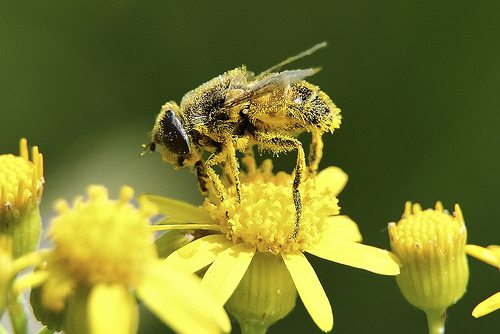

Environment
Green NGOs defend bee-harmful pesticides ban after Bayer and Sygenta’s legal action
A number of environmental organisations have appealed to the European Court of Justice to defend the ban on neonicotinoid pesticides, imposed by the European Union because of their impact on declining bee populations, after two leading chemical firms challenged it in August.
The two-year ban was agreed by state members in April, as a measure to stop the decline of the pollinators. This came after a link had emerged between the neonicotinoids and the loss of bees, which are essential to agriculture and ecosystems.
However, chemical giant Syngenta said in August that the European Food Safety Authority’s assessment of the pesticides was inaccurate and incomplete and that it had “no choice” other than to proceed with a legal case. Bayer also revealed it would be legally opposing the ban.
But now, seven environmental organisations, including Greenpeace, ClientEarth and the Pesticides Action Network Europe, have decided to respond to the action undertaken by the two firms.
Greenpeace EU agriculture policy director Marco Contiero said,”Bayer and Syngenta have unleashed their lawyers to attack a ban which is scientifically rigorous, legally sound and helps protect the general interests of European farmers and consumers
“The partial ban of these three pesticides is only a first but necessary step to protect bees in Europe. It must be defended from the attacks of companies pursuing their private interests to the detriment of our environment.”
Greenpeace has also published a new study that shows that when plants’ seeds are treated with neonicotinoids, the chemical stays in the nectar eaten by bees, with potentially deadly consequences.
Shortly after the ban was imposed in December, British beekeepers and farmers criticised it because of a lack of clarity on the potential effects and because it was feared that it might force farmers to turn to old chemicals with even worse consequences.
The British Beekeepers Association, one of the organisations to question the ban, has been condemned in the past over its links with pesticide manufacturers including Bayer and Sygenta.
Further reading:
Chemicals firm launches legal case against EU ban on bee-harming pesticides
Study: presence of bees ‘underestimated’ and improves value of crops
Brief contact with pesticides can stress bees and cause colony failure
Pesticides linked to biodiversity loss, as well as bee decline
EU member states vote to ban fourth pesticide linked to bee decline


 Environment12 months ago
Environment12 months agoAre Polymer Banknotes: an Eco-Friendly Trend or a Groundswell?

 Features11 months ago
Features11 months agoEco-Friendly Cryptocurrencies: Sustainable Investment Choices

 Features12 months ago
Features12 months agoEco-Friendly Crypto Traders Must Find the Right Exchange

 Energy11 months ago
Energy11 months agoThe Growing Role of Solar Panels in Ireland’s Energy Future




























